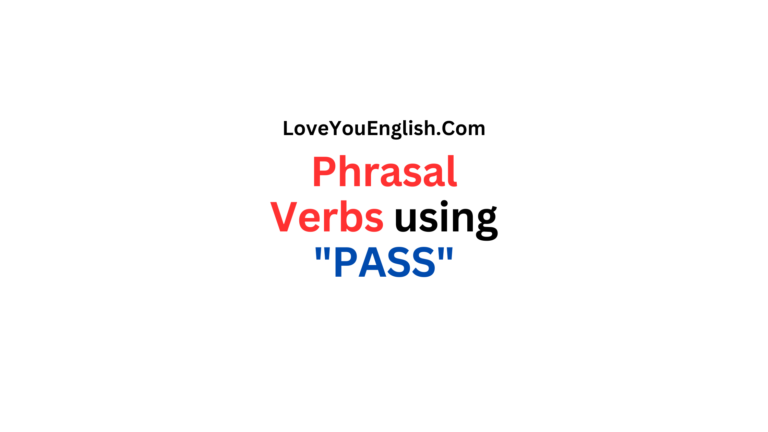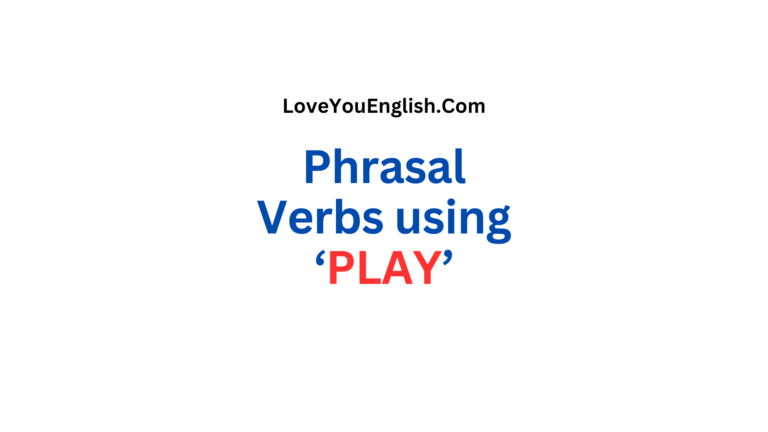Phrasal Verbs: Common Examples & Their Meanings
Have you ever felt confused when someone says, “give up” or “run into”? These are phrasal verbs, and they are a big part of everyday English. Learning them can help you understand and speak English more naturally.
Phrasal verbs are phrases made up of a verb and one or more particles (prepositions or adverbs). Their meanings are often different from the original verb, making them tricky for English learners.
But don’t worry! I will explain common phrasal verbs in simple words.
What Are Phrasal Verbs?
A phrasal verb is a combination of:
- A verb (e.g., take, give, put)
- A particle (preposition or adverb, such as up, on, in, out)
For example, in “give up”, “give” is the verb, and “up” is the particle. The phrase means to stop doing something.
Types of Phrasal Verbs
There are three types of phrasal verbs:
- Transitive Phrasal Verbs – These need an object.
- Example: She turned off the TV. (TV is the object.)
- Intransitive Phrasal Verbs – These don’t need an object.
- Example: He woke up early.
- Separable and Inseparable Phrasal Verbs
Common Phrasal Verbs & Their Meanings
1. Phrasal Verbs for Daily Life
- Wake up – Stop sleeping
- I wake up at 7 a.m. every day.
- Get up – Leave the bed
- She got up late on Sunday.
- Turn on – Start a device
- Turn off – Stop a device
- Please turn off the lights before you leave.
- Run out of – Have no more of something
- We ran out of milk, so I went to buy some.
2. Phrasal Verbs for Communication
- Speak up – Talk louder
- Call back – Return a phone call
- Hang up – End a phone call
- She hung up without saying goodbye.
- Cut off – Interrupt someone’s call
- The phone call was cut off due to poor signal.
- Bring up – Start talking about a topic
- She brought up the issue in the meeting.
3. Phrasal Verbs for Work & Study
- Look up – Search for information
- Hand in – Submit something
- Catch up – Reach the same level as others
- Drop out – Quit school or a course
- He dropped out of college last year.
- Take on – Accept responsibility
4. Phrasal Verbs for Travel & Movement
- Set off – Start a journey
- Get on – Enter a bus, train, plane
- Get off – Leave a bus, train, plane
- He got off at the wrong station.
- Check in – Register at a hotel or airport
- Check out – Leave a hotel
- We checked out before noon.
5. Phrasal Verbs for Relationships & Social Life
- Get along with – Have a good relationship
- She gets along with her coworkers.
- Run into – Meet someone by chance
- I ran into my old teacher yesterday.
- Break up – End a relationship
- They broke up after five years.
- Make up – Become friends again
- They had a fight but later made up.
- Look after – Take care of
- She looks after her younger brother.
6. Phrasal Verbs for Feelings & Emotions
- Cheer up – Become happy
- She was sad, so I tried to cheer her up.
- Calm down – Relax after being angry
- He was upset, but he calmed down later.
- Break down – Start crying
- She broke down when she heard the bad news.
- Give up – Stop trying
- He gave up after several attempts.
- Put off – Delay something
- She put off her trip due to bad weather.
7. Phrasal Verbs for Money & Shopping
- Pay back – Return borrowed money
- I will pay you back next week.
- Save up – Collect money for something
- Run up – Accumulate debt
- She ran up a huge bill at the store.
- Splash out – Spend a lot of money
- They splashed out on a luxury vacation.
- Cut down on – Reduce expenses
Tips for Learning Phrasal Verbs
- Group Them by Topic – Learning related phrasal verbs makes it easier to remember.
- Use Flashcards – Write the phrasal verb on one side and the meaning on the other.
- Practice in Sentences – Try making your own sentences with each phrasal verb.
- Watch Movies & Listen to Conversations – Many phrasal verbs are common in spoken English.
- Use Them in Daily Life – The more you practice, the more natural they will become.
Final Thoughts
Phrasal verbs are an important part of English. They can be confusing, but with practice, you will understand and use them easily. Start with the common ones in this post and try to use them in your conversations. The more you use them, the more confident you will feel in English.
Keep practicing, and soon, phrasal verbs will become a natural part of your vocabulary!
Happy learning!
Read more:
- Phrasal Verbs for Discussing Hobbies and Interests
- The Difference Between Phrasal Verbs and Idioms
- Phrasal Verbs to Use When Making Plans
- Basic Phrasal Verbs for Talking About Daily Activities
- Talk About Technology: 25 English Phrasal Verbs
- Phrasal Verbs for Talking About Work and Office Life
- Top 20 Phrasal Verbs for Everyday Conversations
- Phrasal Verbs for Talking About Work Tasks and Projects
- Phrasal Verbs to Express Emotions and Feelings









